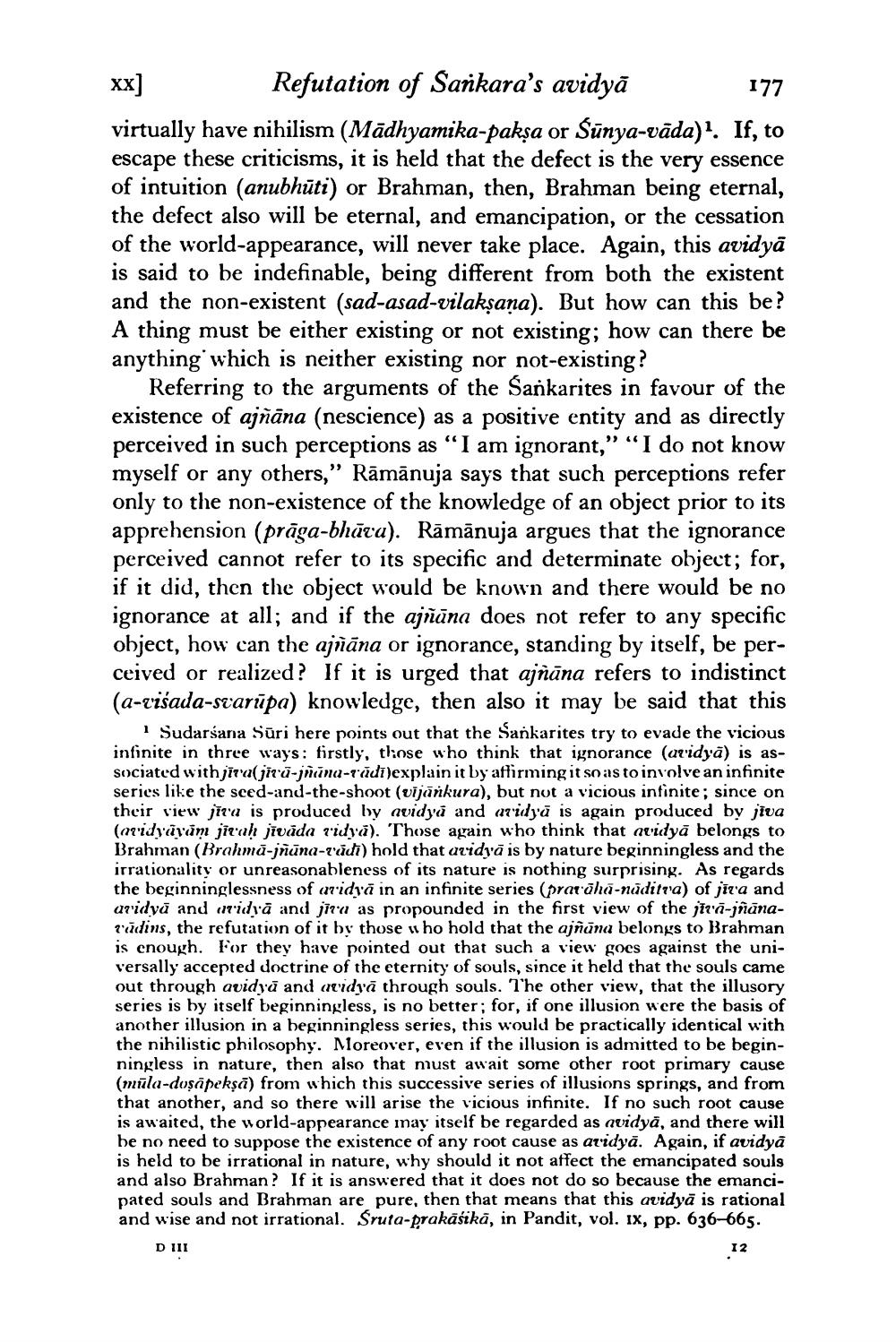________________
Refutation of Sankara's avidyā
177 virtually have nihilism (Mādhyamika-pakṣa or Sünya-vāda)? If, to escape these criticisms, it is held that the defect is the very essence of intuition (anubhūti) or Brahman, then, Brahman being eternal, the defect also will be eternal, and emancipation, or the cessation of the world-appearance, will never take place. Again, this avidyā is said to be indefinable, being different from both the existent and the non-existent (sad-asad-vilakṣaṇa). But how can this be? A thing must be either existing or not existing; how can there be anything which is neither existing nor not-existing?
Referring to the arguments of the Sankarites in favour of the existence of ajñāna (nescience) as a positive entity and as directly perceived in such perceptions as “I am ignorant," "I do not know myself or any others,” Rāmānuja says that such perceptions refer only to the non-existence of the knowledge of an object prior to its apprehension (prāga-bhāra). Rāmānuja argues that the ignorance perceived cannot refer to its specific and determinate object; for, if it did, then the object would be known and there would be no ignorance at all; and if the ajñāna does not refer to any specific object, how can the ajñāna or ignorance, standing by itself, be perceived or realized? If it is urged that ajñāna refers to indistinct (a-visada-sparūpa) knowledge, then also it may be said that this
Sudarsana Sūri here points out that the Sankarites try to evade the vicious infinite in three ways: firstly, those who think that ignorance (avidyā) is associated withjītajiru-jung-Tādi)explain it by aflirmingit so as to involve an infinite series like the seed-and-the-shoot (vijārkura), but not a vicious infinite; since on their view jita is produced by avidya and aridyā is again produced by jiva (avidyāyam jitah jīvāda ridyā). Those again who think that acidyā belongs to Brahman (Brahma-jnuna-tudi) hold that aridyā is by nature beginningless and the irrationality or unreasonableness of its nature is nothing surprising. As regards the beginninglessness of aridyā in an infinite series (pratūhā nāditra) of jīra and ar'idyā and ridvā and jiru as propounded in the first view of the jītā-jñānaPudins, the refutation of it by those who hold that the ajñāna belongs to Brahman is enough. For they have pointed out that such a view goes against the universally accepted doctrine of the eternity of souls, since it held that the souls came out through avidyā and avidyā through souls. The other view, that the illusory series is by itself beginningless, is no better; for, if one illusion were the basis of another illusion in a beginningless series, this would be practically identical with the nihilistic philosophy. Moreover, even if the illusion is admitted to be beginningless in nature, then also that must await some other root primary cause (müla-dosāpeksā) from which this successive series of illusions springs, and from that another, and so there will arise the vicious infinite. If no such root cause is awaited, the world-appearance inay itself be regarded as avidyā, and there will be no need to suppose the existence of any root cause as aridyā. Again, if avidya is held to be irrational in nature, why should it not affect the emancipated souls and also Brahman? If it is answered that it does not do so because the emancipated souls and Brahman are pure, then that means that this avidyā is rational and wise and not irrational. Sruta-prakāśikā, in Pandit, vol. ix, pp. 636-665. DIII
12




